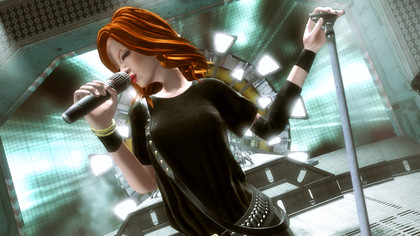Interview: Guitar Hero CEO, Dan Rosensweig
Activision's music man on the future of its golden goose
TR: And what about your own personal history? What is your own experience and background? What to you bring to the Guitar Hero table?
DR: I spent the majority of my career in special-interest magazine publishing. I worked my way up through the ranks [at Ziff-Davis] to ultimately becoming the publisher of the largest franchise (which was PC Magazine). Then around 1996 or '97 I got really enamoured with this new thing called the internet. And then moved out of publishing PC Magazine to launching a series of internet magazines about and around the internet, including one called Yahoo Internet Life - which gave me the opportunity to meet with the founders and the people that were building Yahoo at the time. And I got very excited about that.

And within Ziff-Davis, as we were a technology magazine company, we were among the first to see the potential of the internet and we pulled out a separate division of the company called ZDNet. Which was the largest technology website in the world, competing with a site called CNet. I had the chance to become CEO of ZDNet and take it public in 2000. And as the crash began to come, we merged with CNet, then got very familiar and comfortable with gaming – because I had also acquired Gamespot, which is one of the largest gaming sites in the world. And I've always been enamoured by people's passions and gamers are very passionate.
After that I joined Yahoo as Chief Operating Officer from 2002 to 2006 and at the end of that five-year run I'd obviously become very deeply immersed in the internet, and very excited about interactive content, personalised experiences and how connectivity really does change the world and create new opportunities for businesses and consumers. After I'd retired from that job, I went into private investing in Telco, media and gaming companies.

Along came Bobby Kotick, the CEO of Activision, who was also a good friend of mine from when he was on the board at Yahoo – who had been repeatedly calling me about the internet and the connectivity of consoles and where the gaming industry would go in the future. He then started talking to me about Guitar Hero, as Bobby knows that I am also a huge music fan. I have a great passion for music. It is my personal passion.
And then, over a period of time, we got into really exciting conversations about the power of the franchise, where the franchise was going to go and how interactive content was really going to dominate consumer entertainment for the next five or ten years, how the merger of interactive content and videogames and connectivity can create whole new experiences for consumers on a global basis... and whole new business models. So Bobby asked me to take over and join and run Guitar Hero – and I checked in with my daughters, who both love the game! – and I came on board back in April this year. And I've been having a blast ever since!
TR: There have been a few reports recently claiming that the music gaming market is becoming saturated. What is your response to that?
Get daily insight, inspiration and deals in your inbox
Sign up for breaking news, reviews, opinion, top tech deals, and more.
DR: Well, firstly, I hope not! And secondly, I don't think so.
Clearly the recession has affected all consumer products, all business products. There have been headwinds for quite some time in a lot of industries, but it is only recently that the gaming industry has begun to feel it. Really, this year. So it interrupted later and smaller in the gaming industry. And the reason for this is that interactive content, gaming and video-gaming creates such value for the dollar. Consumers really do love gaming and it was one of the last things that they really wanted to cut back on during these difficult times. Ultimately it has affected the overall industry. We will see whether or not it is temporary around the economy.
But in terms of the music gaming category, we should really separate it. In Europe, the music gaming category has grown 25 per cent this year. And Guitar Hero has grown 59 per cent this year, in the first nine months. Also, the music gaming category is the second largest selling game franchise of any category. And Guitar Hero is number one in that category. So, despite the headwinds, it is a really enviable position to be in.
In the US there have been reports that gaming was down 26 per cent and the music gaming category was down something like 45 per cent. And although there is truth to the slowing right now, a lot of that has to do with the economy. Also, a lot of it has to do with the fact that what that measurement is based on is net revenue. And as the Guitar Hero franchise – which is the leading player in the space – begins to move from selling mostly hardware and software together... as we get a larger installed base of our hardware, most of our sales have shifted from hardware to software. Which has a lower price tag to the consumer.
So if the guitar and software costs $99, the software alone costs $59. So that alone affects the net revenue number that you see. But unit volume has actually been quite substantial this year. So the user interest in the games has not really wavered. At all. The percentage of consumers that are buying these games has gone up. The number of units we sold this year – in the first six or seven months of this year, at least – has been something like six million units of something that has the Guitar Hero name on it. So we remain very passionate and very excited about growth. And consumers remain very passionate about the game. And the success of Guitar Hero 5 this holiday season, I think, really reflects that.
Current page: Has the music gaming category peaked?
Prev Page A potted history of Guitar Hero Next Page Beating the Beatles (Rock Band)